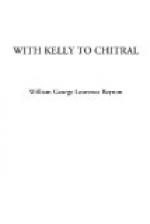At one place we had a short halt on account of a battery pony, which was amusing itself by rolling down a slope with a gun on its back; it was brought back nothing the worse for its escapade, and we resumed our march.
Before getting into camp, our road led up from the lower valley on to some gentle, undulating spurs of the main range of hills; here there was a cluster of villages, and every available spot was cultivated.
On one of these spurs we camped, where three small villages or clusters of houses formed a triangle, the centre of which was a cornfield. This formed an excellent halting-place, as the men were billeted in the houses, each giving the other mutual protection. We formed our mess in part of the rooms of the headman’s house, one Russool of Khusht; he was foster-father to the late Nizam-ul-mulk, but had acknowledged the opposition and joined Sher Afzul. (In the photograph he is sitting half hidden behind the Mehter’s left arm, with his head rather raised.)
As we had been great friends during my first visit to Chitral,—(he was awfully fond of whisky),—I’ve no doubt he was pleased to hear I had been his guest in his own house, but I never had an opportunity to thank him, as he left Chitral hurriedly just before our arrival. The house is the best I have seen in Chitral, a fine stone-paved courtyard, surrounded on three sides with rooms and a verandah, a fine old chinar tree near the gateway on the fourth side. The principal rooms are high and larger than usual, but of the usual pattern. I think we got two companies of the Pioneers and ourselves into this house alone.
By three o’clock we had settled down, and were getting dry. The Levies were sent out foraging, and brought in several ponies. As our stores decreased, and more ponies were brought in, we had spare ponies for riding, and we were nearly all mounted by the time we reached Chitral. However, we had not been there ten days before the owners began turning up, and we were ordered to give them back, much to our disgust. It was quite a treat to be in camp and settled before dark, and I’ve no doubt the coolies were as thankful as we were. The only drawback to our food was the flour of which the chupatties were made; it was coarse to a degree, and seemed to consist chiefly of minute speckly pieces of husk, which used to tickle our throats up in the most unpleasant manner, and had a nasty habit of choking the swallower, in addition to being highly indigestible. We used at last to sift the flour through linen, and the residuum was a surprise and revelation.




